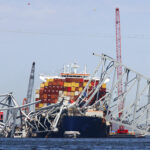Germany’s Allianz announced that it would report a net loss for the third quarter of 2.5 billion Euros ($2.525 billion) and a net loss of 924 million Euros ($933 million) for the first nine months of 2002 due to a number of exceptional events.
Allianz results were heavily affected by losses at its subsidiary Dresdner Bank, which contributed 972 million Euros ($981 million) to its parent’s losses. Even Allianz admits Dresdner will not begin earning any money until next year at the earliest.
During the third quarter Allianz also increased reserves at its Fireman’s Fund subsidiary by $750 million, mainly due to higher provisions for asbestos related liabilities, and set aside 664 million Euros ($670 million) to handle flood losses in Germany and Eastern Europe.
Writedowns in the value of investments in what Allianz characterized as “the extremely weak capital markets” amounted to 1.9 billion Euros ($1.92 billion) during the period.
The huge losses should be viewed in light of the overall weakness of the German economy which continues to experience high unemployment, falling investment values and company failures. These in turn have caused banks, insurers and other financial providers to make higher porovisions for bad loans and has decreased the overall value of their investment portfolios.
The poor quarterly performance obscures the real growth in the company’s insurance operations. Excluding the 3.5 billion Euros Allianz booked earlier in the year from the unwinding of its investments with Munich Re, P/C net grew from 2.276 billion Euros ($2.3 billion) for the first 9 months of 2001 to 2.886 billion Euros ($2.91 billion) this year. Overall P/C premium income for the first 9 months rose 4.6 percent to 33.6 billion Euros ($34 billion). Allianz remains the world’s largest P/C insurer measured by sales.
While one off capital gains have helped earnings this year, Allianz is still struggling to return to profitability. Most analysts feel that its take-over of Dresdner Bank is the main drag on its earnings. Bad loans and lower investment values have probably made Dresdner worth far less than the 24 billion Euros Allianz paid to take over 100 percent of the bank last year.
If it can solve its problems with Dresdner, Allianz is otherwise in relatively good shape. Although the floods in Europe had an impact, most of the combined ratios of its P/C divisions have been dropping. The notable exception being Fireman’s Fund, which ballooned from 104.1 percent to 132.1 percent during the first 9 months of 2002. Allianz, along with the rest of the industry, is seeing improvement in rates across the board, and remains one of the companies in the best position to profit from the current hard market.
Chairman of the Board of Management Henning Schulte-Noelle expressed a note of optimism when announcing the results, stating that ” The low point should be behind us. The absence of one off burdens, an improved combined ratio in the insurance business and the positive returns from the initiated restructuring efforts will now again lead to an upward trend.” Allianz and its shareholders hope he’s right.
Was this article valuable?
Here are more articles you may enjoy.


 Insurer Chubb Readies $350M Payout Tied to Baltimore Bridge Collapse
Insurer Chubb Readies $350M Payout Tied to Baltimore Bridge Collapse  Everton FC Buyer Accused of Fraud, Double-Pledging Assets in Lawsuit
Everton FC Buyer Accused of Fraud, Double-Pledging Assets in Lawsuit  Progressive Set to ‘Maximize’ Growth, Building on Q1
Progressive Set to ‘Maximize’ Growth, Building on Q1  Cracks in O’Hare Columns Aren’t Insured Property Damage, Just Bad Product – Court
Cracks in O’Hare Columns Aren’t Insured Property Damage, Just Bad Product – Court 

